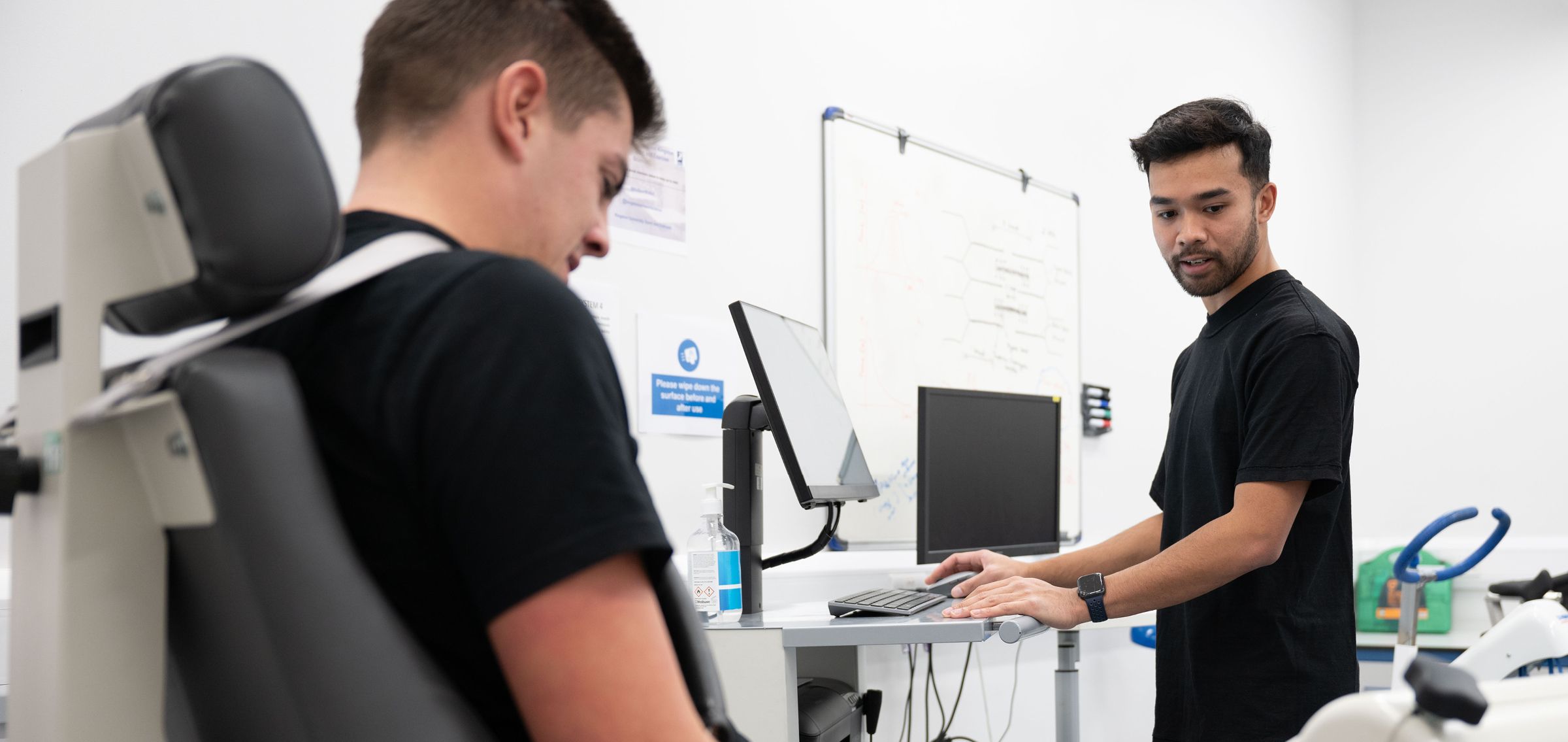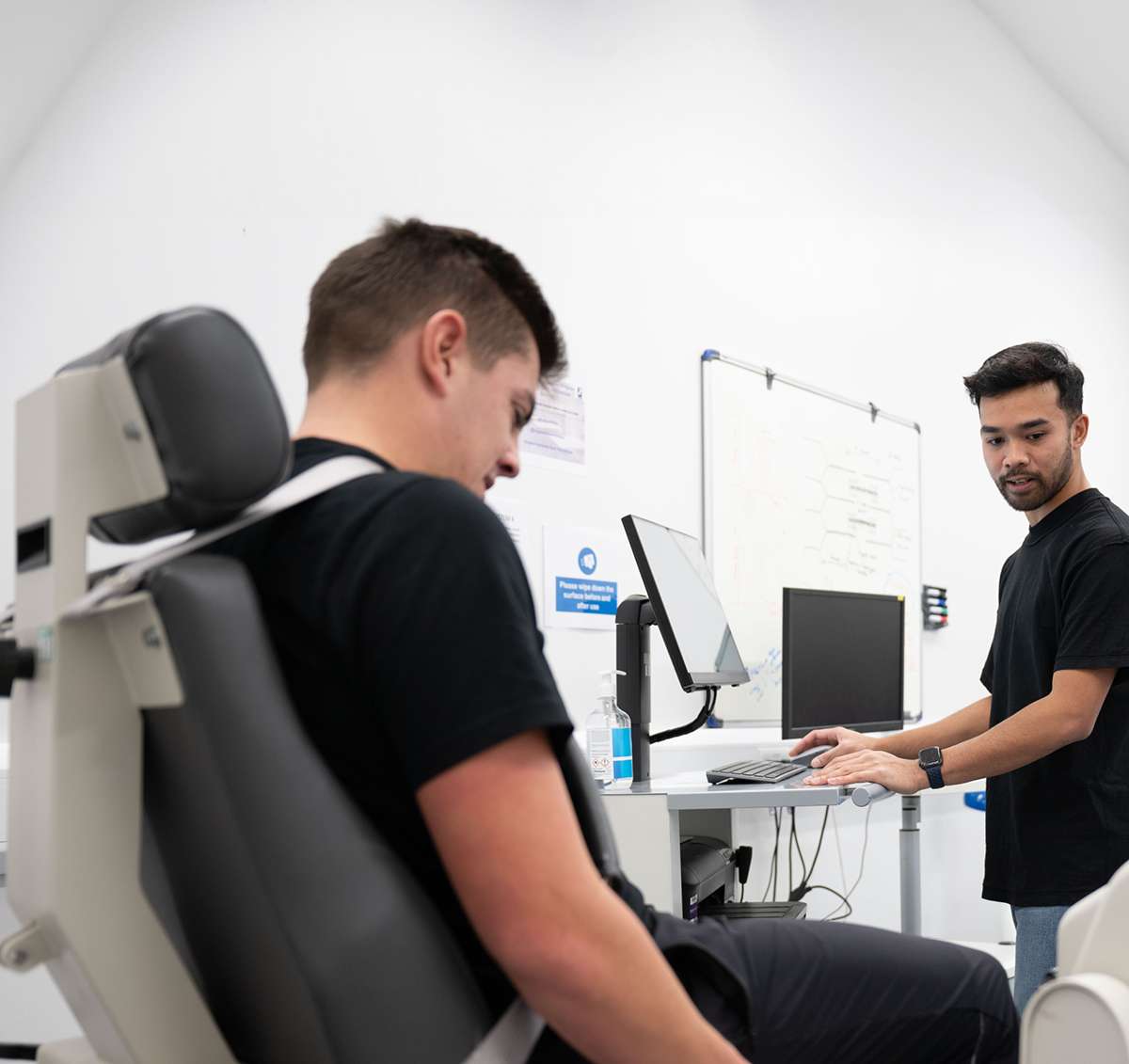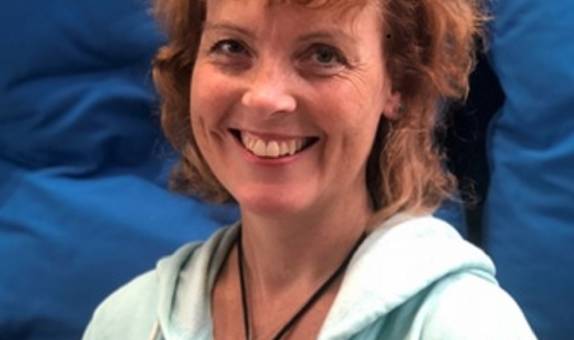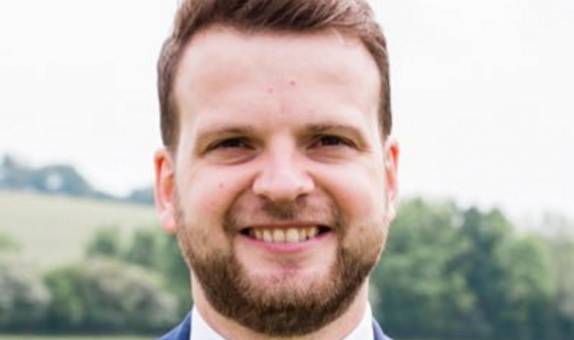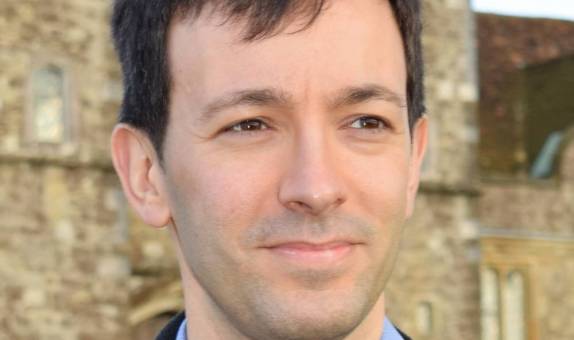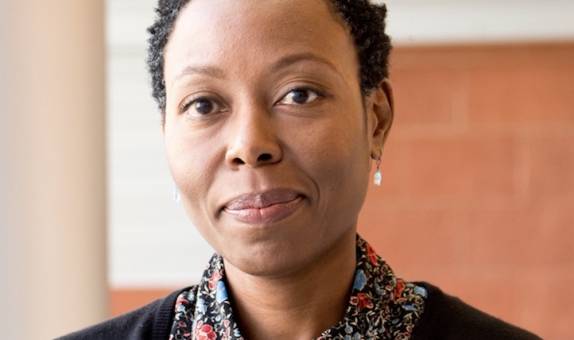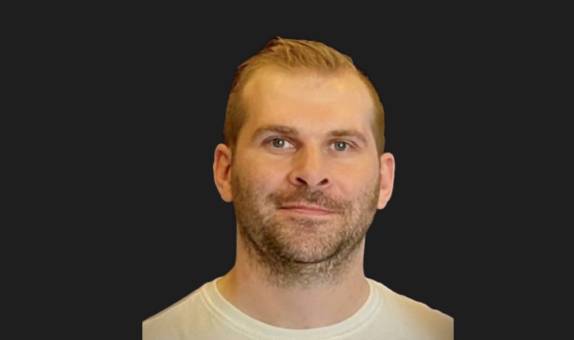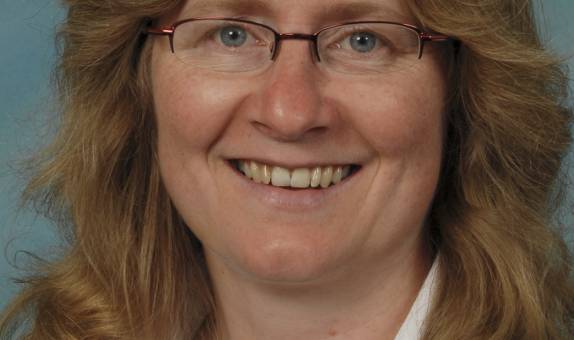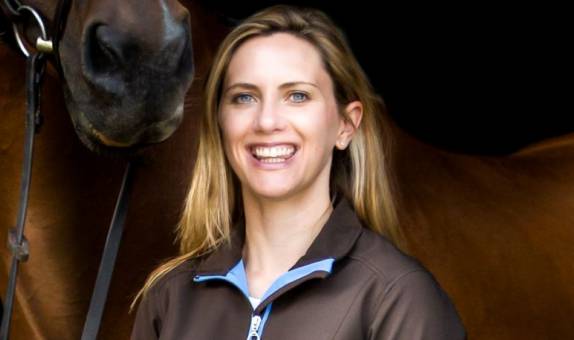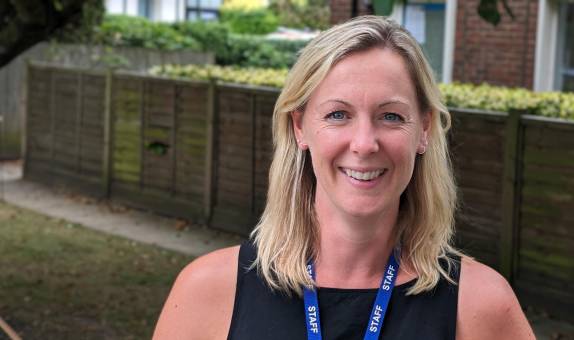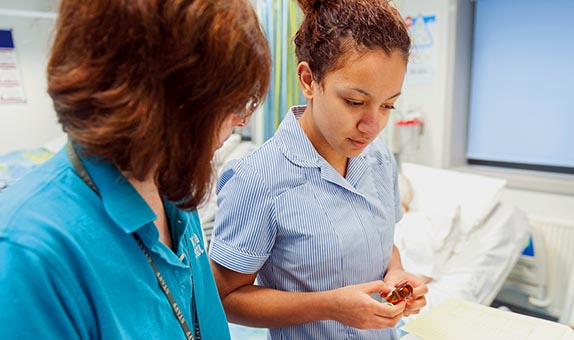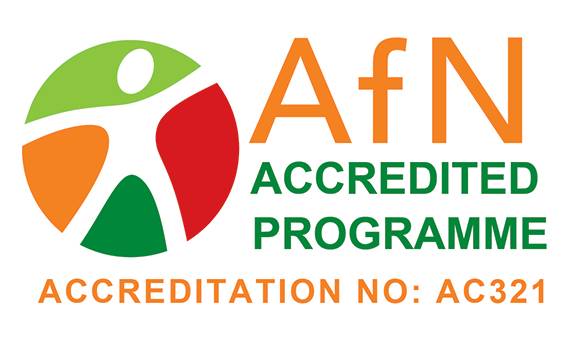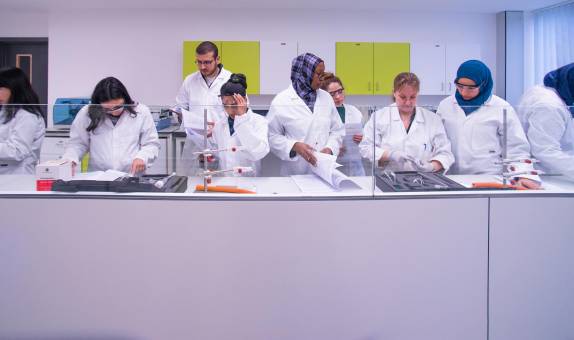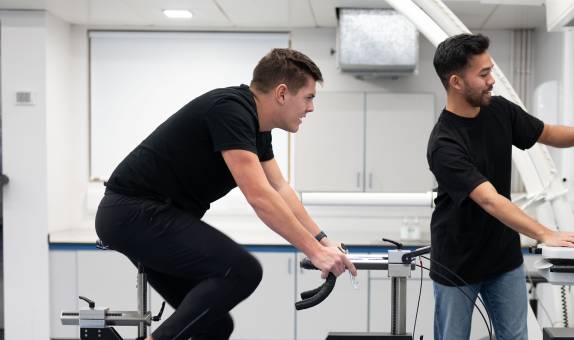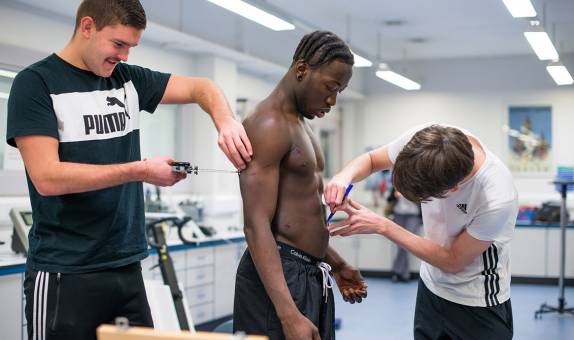Sport and Exercise Science (Nutrition) BSc (Hons)

Teaching Excellence Framework (TEF) Gold award
Our commitment to high quality teaching has been recognised with a TEF Gold rating. The University has received an overall rating of Gold, as well as securing a Gold award in the framework's two new student experience and student outcomes categories.
Why choose this course?
Would you like to promote good health and help to prevent disease? A practical knowledge of the benefits of nutrition and exercise can improve people's wellbeing.
This course studies anatomy, physiology, energy metabolism, nutrition, sport and exercise psychology and other related subjects. You'll examine the promotion of exercise and nutrition to improve people's physical and mental health.
You'll have access to excellent specialist facilities, including a Bod Pod machine, bespoke nutrition kitchen and a highly experienced, dedicated team to help you make the most out of your time with us.
Through optional modules in Year 3, you can focus on nutrition, sport and exercise science or a combination, including contemporary issues in food and nutrition, or ergogenic aids and extreme environments, making your degree bespoke to you. The four-year professional placement has a year's industry-related work experience.
The Nutrition and Dietetics subject area at Kingston University has the top NSS score in London and nationally for 15 out of 27 NSS 2023 questions, scoring 100% in the positivity measure for all 15 questions. This is the highest number of questions to achieve 100% in the positivity measure across all providers in the Nutrition and Dietetics subject area (there are 42 providers with NSS data for 2023).
Note: this course was previously called Nutrition (Exercise and Health) BSc (Hons)
| Attendance | UCAS code/apply | Year of entry |
|---|---|---|
| 3 years full time | BB49 | 2025 |
| 4 years full time including professional placement | BB4X | 2025 |
| 4 years full time including foundation year | CB64 | 2025 |
| 6 years part time | Apply direct to the University | 2025 |
Please note: Teaching on this course may take place on more than one KU campus.
| Main Location | Penrhyn Road |
Reasons to choose Kingston University
- This degree is accredited by the Association for Nutrition (AfN).
- Your learning will be supported by co-curricular activities, highly valued by the Association for Nutrition (AfN) and by employers.
- You'll benefit from being part of a friendly, inclusive group and from staff expertise in teaching, research and professional practice.
- Our Nutrition courses scored 100% in the positivity measures for 15 out of 27 questions in the 2023 NSS survey (top NSS score in London and nationally).
Nutrition at Kingston University
Nutrition kitchen
Our modern nutrition kitchen is a flexible and inviting learning space that is used for a variety of purposes such as food science practicals, research projects, and student nutrition society events.
The kitchen is also used for small group teaching and personal tutor meetings. This makes it a valuable resource for all nutrition students, who can use it to learn, collaborate, and network.
To experience the kitchen for yourself, please take a virtual tour.

What you will study
Please note that this is an indicative list of modules and is not intended as a definitive list. Those listed here may also be a mixture of core and optional modules.
Year 1
Year 2
Final year
Year 1 introduces the fundamental concepts of food and nutrition, human anatomy, exercise and physiology, together with sport and exercise psychology. You will also study the essential principles of scientific investigation.
Core modules
Introduction to Food and Nutrition
30 credits
Explore the reasons behind our food choices, why we eat what we eat. Discover the science behind food and nutrition. Learn about the composition of food, basic applications of food science in everyday life, how nutrients are metabolized in the body, how dietary reference values are derived and applied. You will also explore key concepts that underpin energy and nitrogen balance and learn about functions, sources, deficiency and toxicity of vitamins and minerals. You will learn about all macronutrients plus water and alcohol. A busy module but essential knowledge to any aspiring nutritionist.
Essentials for Sport, Exercise and Nutrition Sciences
30 credits
This module provides an essential introduction to the skills required for undergraduate study and scientific research. It enables you to understand the principles of qualitative and quantitative experimental research. It will introduce and employ statistical techniques for the analysis of sport science and nutrition data. The skills developed in this module will begin to formulate the foundation to later research methods modules and your final year project.
Sport and Exercise Psychology 1
30 credits
This module introduces the fundamental constructs of sport and exercise psychology and how they impact on our understanding of human behaviour and learning in sport and exercise environments. These constructs include personality, motivation, anxiety, stress as well as the learning and performance process. You will also learn about the theories of motor control and motor learning.
Topics include:
- The role of the self in sport and exercise, how this develops and impacts wellbeing and performance
- Theories of personality development and the role it plays in sport and exercise
- Different perspectives on motivation in sport and exercise
- Theories of arousal, stress and anxiety and how they might impact sport/exercise environments
- The role of psychology in the uptake and maintenance of physical activity
- How exercise is linked to maintaining/improving psychological health
- The role of perception and attention in the ability to learn and perform motor skills
- Sport and exercise psychology research methods.
Functional Anatomy and Exercise Physiology
30 credits
Understanding the mechanics of the body is the building block of sport and exercise science.
You will be introduced to the fundamentals of functional anatomy and physiology, particularly the skeletal, neural, muscular, metabolic, respiratory and cardiovascular systems. The focus will be on understanding the biomechanics of movement and physiological responses to the demands of physical activity.
Year 2 extends your knowledge of the effects of nutrition, sport and exercise on human physiology and exercise prescription. You will examine the principles of energy metabolism and develop your understanding of health and exercise physiology and sport and exercise psychology. A module in research methods will prepare you for your Year 3 research project.
If you choose the four-year sandwich route of this degree, you will have a year's industry-related work experience between Years 2 and 3.
Core modules
Applied Nutrition
30 credits
Learn about how we study diet and health outcomes and the different types of studies we use. You will carry out dietary assessments and learn how we use that data to understand and improve people's health. Our food choices and ability to meet nutritional needs impacts us all, from womb to older adults. This module will help you learn about the nutritional needs of different people across the lifespan as well as what impacts their ability to meet those needs. You will grow your understanding of the needs of individuals and of the groups to which they belong. This module prepares you for studying public health nutrition in your final year.
Sport and Exercise Psychology 2
30 credits
You will build on your sport and exercise psychology from your first year. You will explore social psychology in sport and exercise, including group dynamics. You will also explore the psychology and development of the individual in exercise settings and the benefits of exercise to maintain psychological health and wellbeing.
Topics include:
- Motivation in sport and exercise settings and the developments of differing perspectives in this area.
- Group dynamics in sport and exercise settings and how this might influence group satisfaction and performance.
- Aggression in sport contexts.
- Burnout in athletes, including psychological components, mechanisms and experiences.
- Career transitions for sport performers, and the role sport psychology may play in assisting transitions.
- Moral development in young athletes, and the role of morality in competitive sports contexts.
- The role of emotions experienced on an inter and intra personal level in sport and exercise environments.
- Theories of exercise adoption and maintenance.
Health and Exercise Physiology
30 credits
This module covers the acute and chronic physiological changes caused by exercise, giving you an understanding of cardio-respiratory health. You will learn to link exercise physiology to performance. You will understand the role of exercise and physical activity as a prescription therapy to clinical diseases. This module will further develop your understanding by equipping you with the scientific skills to monitor and assess health, fitness and performance.
Research Methods in Sport, Exercise, and Nutrition Sciences
30 credits
This module focusses on the approaches to research design, data collection techniques and appropriate analyses to make accurate interpretations. It further investigates quantitative and qualitative research methods introduced at Level 4 and introduces you to more advanced techniques. The module provides an essential introduction to research ethics and the ethical approval procedures that are required when using human participants for research.
Skills developed in this module will form the foundation of your final year project module. This module also provides you with an overview of how to recognise and develop key and transferable skills to enhance employability through relevant professional development and research experience. The Future Skills Explore Learning Outcomes are delivered in this module.
In final year, you will apply your knowledge of nutrition and exercise to topics such as the role of nutrition in health and disease, public health promotion, and the psychological issues relating to health and exercise. You may study either contemporary issues of food and nutrition or nutritional ergogenic aids and the extreme environment. You will also undertake an independent project, focused on exercise, nutrition or health science.
Core modules
Public Health Nutrition
30 credits
In your second-year core nutrition module you focused on the nutritional needs of individuals. That module helped build a strong foundation for this public health nutrition module. You will now learn about the concepts, theories, and practice of health promotion, focusing on diet and physical activity in developing and developed countries. You will examine theories of motivation, behaviour, and strategies of health promotion, as well as the role, influence, and impact of policies on population and client groups. You will also learn about nutritional issues impacting the developing world focusing on the unique challenges of nutritional assessment, food security, sustainability (focusing on sustainable development goals), and the double burden of malnutrition. You will also review the impact of direct and indirect health-care and non-health-care sector interventions who affect nutrition outcomes.
Exercise and Health Psychology
30 credits
This module covers the psychology behind adoption and maintenance of physical activity/exercise and health behaviours.
You will explore theories of behaviour prediction and evaluate research surrounding the benefits of physical activity/exercise for psychological health and wellbeing. You will conduct evaluations of interventions aimed at promoting physical activity and mental health. You will also develop an in-depth understanding of determinants of health behaviour.
Project or Dissertation (Nutrition) OR Sport and Exercise Science Project
30 credits
Choose between the following:
Project or Dissertation (Nutrition)
You spent two years learning about how to select, interpret and use scientific literature. You learned about data analysis and interpretation. You covered a large number of nutrition topics. You can now conduct a capstone project that demonstrates your academic and transferable skills, where you will be able to demonstrate knowledge, understanding, application, and integration of nutrition gained from your taught modules. You will be able to choose a topic to research, more aligned to your interests, e.g. public health, food science, the role of specific compounds in food.
OR
Sport and Exercise Science Project
You will get to research an area of your interest, culminating in an original and significant piece of research in this one-year module. You will use the research skills developed through the programme. You will have full access to all sports and exercise laboratory equipment to experience real world data collection and analysis. You will work closely with an assigned supervisor, who will support your progress.
Optional modules
Applied Sport and Exercise Physiology
30 credits
You will advance your understanding of exercise physiology using an integrative/systems approach and apply this to environmental stress, exercise training and different populations for sport performance and health. You will critically evaluate interventions designed to limit the physiological consequences of exercise and environmental stress to improve physical performance in recreationally active to elite athletes. Following this module, you will be able to apply your knowledge and provide evidence-based practical recommendations to enhance human performance during exercise in different environments, conditions, and populations.
Contemporary Issues in Food and Nutrition
30 credits
Explore areas that have a significant impact on modern day food and nutrition, such as functional foods, novel foods (e.g. insects) nutraceuticals (e.g. probiotics), and the interaction between nutrition and pharmacology (e.g. interaction between grapefruit, cranberry or pomegranate juice with drugs).
Gain in-depth knowledge of emerging and re-emerging topics such as malnutrition, food security and genetically modified foods, and food allergy (e.g. recent topics around early dietary intervention, sustainability, plant-based and vegan products, and new ingredients). We will also cover obesity, diabetes, cardiovascular disease, and cancer as well as the use of advanced body composition techniques.
Sport Nutrition
30 credits
You will examine the physiological, mechanical and psychological responses to nutritional dietary strategies and ergogenic aids for exercise training and competition. Challenge your perceptions and cultural choices of food for a diet suitable to meet the demands of competitive exercise and sport performance. You will explore the nutritional strategies that are used by the general population, from recreational amateurs to elite athletes. You will be able to provide sound guidance for informed dietary choices and optimising a person's competitive performance.
You will learn about the efficacy of carbohydrates, proteins and fats for the provision of, exercise and sport performance with specific focus on current dietary guidelines versus dietary differences – low fat, high fat, intermittent fasting, flexitarian, gluten free, carnivore and vegan diets. You will also explore the significance of gut microbiology and use of pre and probiotics to enhance competitive performances.
You will also explore the psychological impact, such as stress and anxiety, on the relationship between nutrition and the body. You will learn about the dietary needs for exercise dependent on duration and intensity, such as maximising attention and concentration, strength, power, middle distance, speed endurance, ultra-endurance events.
You will learn about the dietary needs for specific groups, including youth athletes, female athletes and how their hormones and cycle can affect nutrition and training.
Other important topics such as the sugar endemic, eating disorders and immunity will also be covered.
Please note
Optional modules only run if there is enough demand. If we have an insufficient number of students interested in an optional module, that module will not be offered for this course.
Foundation year
If you would like to study one of our science degrees at Kingston University but are not yet ready to join the first year of a BSc (Hons) course, you can include an extra foundation year within your chosen degree. Please see the Science Foundation Year course page for details of modules.
Future Skills
Knowledge to give you the edge
Embedded within every course curriculum and throughout the whole Kingston experience, Future Skills will play a role in shaping you to become a future-proof graduate, providing you with the skills most valued by employers such as problem-solving, digital competency, and adaptability.
As you progress through your degree, you'll learn to navigate, explore and apply these graduate skills, learning to demonstrate and articulate to employers how future skills give you the edge.
At Kingston University, we're not just keeping up with change, we're creating it.

Entry requirements
Teaching and assessment
Scheduled learning and teaching on this course includes timetabled activities including lectures, seminars and small group tutorials.
It may also include placements, project work, practical sessions, workshops, conferences and field trips.
Who teaches this course
This course is delivered by the School of Life Sciences, Pharmacy and Chemistry.
The School of Life Sciences, Pharmacy and Chemistry offers an outstanding and diverse portfolio of undergraduate and postgraduate programmes in biological and biomedical sciences, chemistry, forensic science, pharmacy, pharmacological and pharmaceutical sciences, and sport science and nutrition.
We've invested heavily in the development of new facilities including laboratories for teaching and research to provide students with access to ultra-modern equipment in a wide range of teaching facilities.
Postgraduate students may run or assist in lab sessions and may also contribute to the teaching of seminars under the supervision of the module leader.
Facilities
There is a wide range of facilities for practical work at our Penrhyn Road campus, where this course is based. You will have access to a modern environment with the latest equipment, including:
- the £9.8 million Eadweard Muybridge building with state-of-the-art laboratories
- an exercise physiology and biomechanics lab
- modern applied biology and chemistry laboratories
- specialist equipment, such as electron microscopes and spectrometers
- computing laboratories and a team of IT technicians to offer assistance
- a newly refurbished state-of-the-art nutrition kitchen.
The Learning Resource Centre offers:
- subject libraries, plus a free inter-library loan scheme to other libraries in the Greater London area
- online database subscriptions
- a growing selection of resource material.

Course fees and funding
Additional costs
Depending on the programme of study, there may be extra costs that are not covered by tuition fees which students will need to consider when planning their studies. Tuition fees cover the cost of your teaching, assessment and operating University facilities such as the library, access to shared IT equipment and other support services. Accommodation and living costs are not included in our fees.
Where a course has additional expenses, we make every effort to highlight them. These may include optional field trips, materials (e.g. art, design, engineering), security checks such as DBS, uniforms, specialist clothing or professional memberships.
After you graduate
There are many opportunities in nutrition, exercise and health-related research, the sport and leisure industries, lifestyle management, health promotion, the NHS, public health and teaching.
Accreditation
All nutrition lecturers are either:
- members of the Association for Nutrition (AfN, our professional body); and
- registered nutritionists with the Association for Nutrition with specialisms in nutrition science or public health or registered public health nutritionists.
or
- registered dietitians with the British Dietetic Association and the Health and Care Professions Council (HCPC).
Nutrition lecturers are also members of the Nutrition Society.
Such links help them to keep up with the latest developments and research ideas.
The course is accredited for 2018 entry by the Association for Nutrition. Accreditation means that Kingston University Nutrition BSc(Hons) graduates can apply to become associate registered nutritionists without having to prove competence. The course was first accredited in 2017. Find out more about the benefits of studying an accredited course.
The Association for Nutrition was launched in March 2010 as a wholly independent not-for-profit professional association registered as a company limited by guarantee. It is the professional body for the regulation and registration of nutritionists, including animal nutritionists, food nutritionists, nutrition scientists, public health nutritionists and sports/exercise nutritionists. The Association aims to protect the public and promote wellbeing by admitting to the UK Voluntary Register of Nutritionists (UKVRN) only those who demonstrate high ethical and quality standards, founded on evidence-based science. It sets proficiency and competence criteria, promotes continuing professional development and safe conduct, and accredits university undergraduate and postgraduate courses.
Studying on an accredited course is a 'mark of quality' and ensures that your course is well structured, organised and relevant to the profession and that it satisfies the demanding requirements and benchmarks of a respected quality assurance framework. It also provides employers with an assurance that graduates have covered set competencies, making them more employable and more likely to stand out to future employers. Accreditation and registration with the UK Voluntary Register of Nutritionists (UKVRN) also shows a strong commitment to continuous professional development and asserts to the public your overall commitment to the nutrition profession and the science that underpins it.
The Nutrition Society was established in 1941 to advance the scientific study of nutrition and its application to the maintenance of human and animal health. The Society is highly regarded by the scientific community and is Europe's largest learned society for nutrition.
What our students say
Links with business and industry
Our staff are actively engaged in research, presenting at international conferences and publishing in high-quality scientific journals. This means that you can be sure your course is being kept up-to-date and delivered by experts in the field.
Staff consultancy services can also give you the chance to observe sport science laboratory assessments of world-class athletes. We provide physiological, biomechanical and psychological support to a variety of athletes and squads including:
- the Great Britain Olympic Canoe and Kayak Team;
- Fulham Football Club; and
- Thames Turbo Triathlon Club.
How you can work in industry during your course
Why take a placement? Work placements:
-
provide work experience that is relevant to your course and future career;
-
improve your chances of graduating with a higher grade degree;
-
enhance your CV;
-
lead to a graduate job;
-
enable you to earn a year's salary whilst studying (the vast majority of placements are paid); and
-
help you to select your final-year project.
Watch nutrition student Michael Garcia talk about his experience studying at Kingston University whilst doing his placement at St. George's Hospital with The Marfan Trust.
Work placement year
"To be successful, tomorrow's leaders will need to be far more rounded individuals than ever before. They will collaborate in pursuit of shared goals. They will guide, challenge and support...They will have an appetite for change and a hunger for continuous improvement, and they will have an ethos of learning and development..."
Jeremy Darroch, Former Chief Executive, Sky
"Doing a placement year effectively gives you one foot in the door of a future job and to stand out from the crowd... as well as enhancing my CV... and future interviews. It's a great motivator to be successful in my studies as it only serves to open even more doors and gain more skills."
Placement student at Jagex Games Studios Ltd
-
81% placement students and 34% non-placement students got a first or 2.1 (Faculty of Computing, Information Systems and Mathematics, 2008).
-
100% of placement students during 2008 recommend doing a placement (Faculty of Computing, Information Systems and Mathematics, 2008).
-
Many employers offer a graduate job to their successful placement students.
There is a lot of support available for students looking to secure a placement (eg a jobs board with placement vacancies, help with writing CVs and mock interviews). Getting a placement and passing the placement year are ultimately the student's responsibility.
For further information please contact the Placements Team by telephone 020 8417 2969 or email secplace@kingston.ac.uk.
Examples of placements
Placements can be with large multinational companies, international companies, local companies and small start ups; offering a diverse range of posts. Here are some examples of employers and roles:
|
Construction-based placement employers |
Construction-based placement roles |
|---|---|
|
RG Group |
Assistant site manager |
|
Science-based placement employers |
Science-based placement roles |
|
Reckitt and Benckiser |
Bioanalytical sciences |
|
Engineering-based placement employers |
Engineering-based placement roles |
|
Airbus |
Analysis of aircraft structure |
|
Computing and IS based placement employers |
Computing and IS based placement roles |
|
Disney |
Database co-ordinator |
|
Mathematics-based placement employers |
Mathematics-based placement roles |
|
Lloyds Banking Group |
Analyst |
Key information set
The scrolling banner(s) below display some key factual data about this course (including different course combinations or delivery modes of this course where relevant).
Course changes and regulations
The information on this page reflects the currently intended course structure and module details. To improve your student experience and the quality of your degree, we may review and change the material information of this course. Course changes explained.
Programme Specifications for the course are published ahead of each academic year.
Regulations governing this course can be found on our website.
